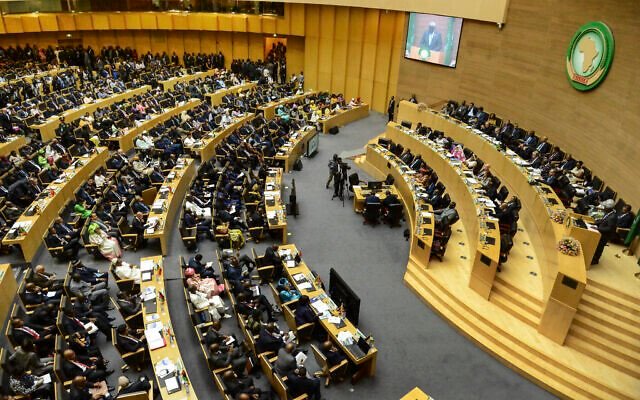AU and IGAD Explicitly Named the Reasons for Sudan’s Ongoing War but Quartet Failed

New York, Sudanhorizon
While the African Union and IGAD have expressed a clear position about the ongoing conflict in Sudan: their view of the causes of the ongoing war, and the solutions required, the four countries that have bestowed themselves the right to determine Sudan’s fate—the International Quartet—have failed to even issue a joint statement explicitly pointing to the fundamental reason for the ongoing war and killing in Sudan, as many observers have noted, and as expressed in a written statement by one of the experts consulted by the US Congressional Foreign Relations Committee.
The African Union, the Intergovernmental Authority on Development (IGAD), and others have been more forthright about the reason for the ongoing war and how, if the flow of weapons into Sudan were stopped, it would be easier to achieve peace.
On the sidelines of the (80) session of the United Nations General Assembly in New York, the Intergovernmental Authority on Development and the African Union issued statements outlining their vision for a roadmap to end the war in Sudan, while the Quartet did not.
IGAD stated that the first condition for achieving peace in Sudan is to halt and prevent foreign interference in the ongoing war, coupled with a comprehensive Sudanese-led political process, establish a clear roadmap for the transition to civilian rule, and work to unify efforts and enhance coordination in the mediation process, which means bringing all mediations and initiatives together.
IGAD Executive Secretary Workneh Gebeyehu indicated in his speech during the ministerial meeting on Sudan, held on the sidelines of the 80th session of the United Nations General Assembly and convened by the European Union, the African Union, France, Germany, and the United Kingdom, that these countries and organizations listened to IGAD’s statement, in which it affirmed the sub-regional organization’s commitment to these principles.
African Union Commission Chairperson Mahmoud Ali Youssef emphasized the urgent need for an immediate ceasefire at the ministerial meeting on Sudan, according to a press release issued Thursday evening, as a prerequisite for the unhindered delivery of humanitarian aid. He emphasized that a comprehensive Sudanese-led dialogue remains the only reliable path to a sustainable solution to the conflict.
Youssef said he briefed the participants on the African Union-led political dialogue scheduled to begin in October. He noted that the meeting welcomed the central role of the African Union and reaffirmed the collective commitment to aligning all efforts under its leadership.
Meanwhile, U.S. Senior Advisor for Africa, Massad Boulos, wrote following the Quartet meeting that on September 25, 2025, on the sidelines of the 80th session of the United Nations General Assembly, “the United States, Saudi Arabia, the United Arab Emirates, and Egypt reaffirmed the importance of ending the conflict in Sudan, restoring peace, and addressing the humanitarian needs of the Sudanese people.”
He added, “The war has gone on long enough, and the President of the United States wants peace.”
However, Cameron Hudson, a prominent expert on East Africa and Sudan, expressed surprise that the ministers of the four countries had not reached a joint statement on the situation.
He wrote on his X account, “It is strange that they still have not been able to agree on a joint statement as a result of this meeting,” adding, almost ironically, “I think the United States has not prepared any new sanctions to improve the agreement like last time.”
Shortlink: https://sudanhorizon.com/?p=7822

